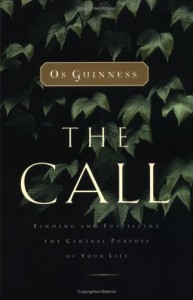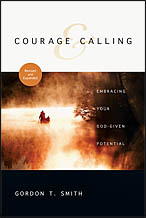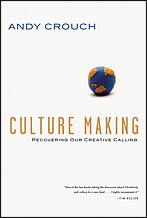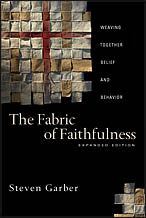I recently wrote about themes of calling and vocation in Chaim Potok’s My Name Is Asher Lev. This got me to thinking:
What are the best books on calling and vocation?
Here are a few that occur to me. What books would you add to the list? These below are all Christian nonfiction books, but novels, secular guides, poetry, anything, is welcome as suggestions.

Os Guinness, The Call: Finding and Fulfilling the Central Purpose of Your Life One of the classics on calling and vocation, this book is made up of many short, reflective chapters that make for good meditative reading. It also features a passage that I’ve quoted more than probably anything else I’ve read:
Our primary calling as followers of Christ is by him, to him, and for him. First and foremost we are called to Someone (God), not to something (such as motherhood, politics, or teaching) or to somewhere (such as the inner city or Outer Mongolia).
Our secondary calling, considering who God is as sovereign, is that everyone, everywhere, and in everything should think, speak, live, and act entirely for him. We can therefore properly say as a matter of secondary calling that we are called to homemaking or to the practice of law or to art history. But these and other things are always the secondary, never the primary calling. They are “callings” rather than the “calling.” They are our personal answer to God’s address, our response to God’s summons. Secondary callings matter, but only because the primary calling matters most. (The Call, p. 31)

Gordon Smith, Courage and Calling: Embracing Your God-Given Potential. If Guinness is reflective, I would characterize Smith as analytical. I go to Smith when I’m looking for a good definition for a concept, or a discussion of some specific issue, such as matching your personal calling with the corporate calling of an organization or business.

Andy Crouch, Culture Making: Recovering Our Creative Calling. The two books above deal directly with an individual’s personal calling. Crouch’s, in contrast, deals the questions of human calling in general: Why do we work? How do we approach culture? Do the artifacts of human culture have eternal value? Editor’s note (12/7/2013, 6:18 pm): Click here for a post focused on Culture Making.

Steven Garber, The Fabric of Faithfulness: Weaving Together Belief and Behavior. Someone —I think it was David McNeill —gave me this book when I transitioning from college to career, and it had a profound influence over my life for many years. Garber explores the issue of living a consistent life, in which our actions, decisions, career, etc., match what we say we believe. This integrity is central to understanding calling and vocation.
Those are a few of my choices. What books would you add? Please add your recommendations to the comments.
The former Associate Director for the Emerging Scholars Network, Micheal lives in Cincinnati with his wife and three children and works as a web manager for a national storage and organization company. He writes about work, vocation, and finding meaning in what you do at No Small Actors.

Michael-I have enjoyed your reflections and challenges; and I agree those volumes you listed are very good and provocative. However as a personal pet peeve, the linking of “calling” and “vocation” is redundant. They mean the same thing. I realize that at a certain level this observation is silly (i.e., “Who cares?”), but when we presume to be educators I do believe we need to be as careful as possible.
Thank you, Dave. Yes, they do mean the same thing – literally, in fact. I use them together mainly to counter the overly religious (on one hand) and overly career-focused (on the other) connotations of the words. But you’re right – I don’t need both.
Hey Mike, Here’s my list, which also includes Smith and Os. In no particular order:
Amy Sherman, Kingdom Calling
Tom Nelson, Work Matters
R. Paul Stevens, The Other Six Days: Vocation Work and Ministry in Biblical Perspective
Gordon Smith, Courage and Calling: Embracing Your God-Given Potential
Os Guinness, The Call: Finding and Fulfilling the Central Purpose of Your Life
Douglas Schuurman, Vocation: Discovering our Callings in Life
Gene Edward Veith, God at Work: Your Christian Vocation in all of Life
William C. Placher, Callings: Twenty Centuries of Christian Wisdom on Vocation
Gustaf Wingren, Luther on Vocation
Steven Garber, The Fabric of Faithfulness
Paul Marshall, A Kind of Life Imposed on Man: Vocation and Social Order from Tyndale to Locke
Leland Ryken, Work and Leisure in Christian Perspective
Sherman and Hendricks, Your Work Matters to God
Lee Hardy, The Fabric of This World: Inquiries into Calling, Career Choice and the Design of Human Work
And two recommendations for law and calling:
Joseph Allegretti, The Lawyer’s Calling
Michael P. Schutt, Redeeming Law: Christian Calling and the Legal Profession
Thank you, Mike – this is a great list. I’m glad you mentioned Paul Stevens and Lee Hardy – they were two I would have included if I had thought a bit more.
Great lists above! Tim Keller’s forthcoming “Every Good Endeavor” looks promising, also. And around mid-career one should consider the complexities illuminated by books like Herminia Ibarra’s “Working Identity.” For the long view (on which Andy Crouch’s “Culture Making” is good), I recommend Richard Mouw’s “When the Kings Come Marching In.” For a theology of scholarly work and imaginative living, the introduction and first chapter of Calvin Seerveld’s (rare and hard to find) “Rainbows for a fallen world” is, in my opinion, incomparably wonderful.
And, of course, one should spend hours reading reviews from Byron Borger at Hearts & Minds Books: http://www.heartsandmindsbooks.com/booknotes/books_on_thinking_christianly/. His review essays themselves are replete with wisdom for vocational discernment.
Thank you, Gideon. I love the idea of mid-career books on vocation. I’m adding Ibarra to my “to read” list. (Along with the others you mention.)
As far as poetry goes, vocation is one of the thematic threads woven throughout Wendell Berry’s “Sabbath poems,” starting with the volume A Timbred Choir and then found as sections in his later books such as Leavings and Given. For an example, see http://www.wisdomportal.com/Gratitude/WendellBerry-Gratitude.html.
I’ve also enjoyed Dorothy Sayers’ “Why Work?”. It’s an essay, not a longer work like many of these, but it’s fun to read. For writers of fiction or drama, the introduction to her play cycle *The Man Born to Be King* has some really helpful thoughts on how to integrate work and faith.
Love the lists offered above. Yes!! The Call is one of my all time favs — and the Lee Hardy book is an old classic that is under-appreciated. Really like all of these… Just a few others…
“What Is Vocation?” Steve Nichols (Presbyterian & Reformed) This is a short booklet but really fantastic, inexpensive and brief. Solid.
“A Sacred Voice is Calling: Personal Vocation and Social Conscience” by John Neafsey (Orbis) Some Catholic liberation theology themes, asking what the needs of the poor and the cries of injustice might say to us as we consider God’s call. Very moving.
“Forgetting Ourselves on Purpose: Vocation and the Ethics of Ambition” by Brian Mahan (Jossey Bass) An extraordinary reflection on ambition, etc. Forward by Robert Coles.
“A Journey Worth Taking” Charles Drew (Crossway) is sort of a “Purpose Driven Life” but gets the role of vocation and calling, from a Reformed perspective, a bit clearer than Warren. I like it a lot.
“Let Your Life Speak: Listening to the Voice of Vocation” Parker Palmer (Jossey Bass) Perhaps a bit too much about one’s interior life, and with less a Christ-centered focus than, say, Guinness, but it has to be listed and many folks love it! Emerged from his research with passionate teachers whom he realized really had this profound sense of calling. Lovely.
The chapter on yearning and the desire for a sense of calling that desribes the longings of students for meaningful learning (for the sake of service) in “Engaging God’s World” by Neal Plantinga (Eerdmans) is beautiful. Most readers of this column, I trust, have that.
“The Messy Quest for Meaning: Five Catholic Practices for Finding Your Vocation” by Stephen Martin (Sorin Books) A narrative of a Roman Catholic student who becomes a journalist, struggling with anxiety and confusion, wondering how to find a sense of purpose in his job. He interviews monks and nuns to learn how they discerned their sense of vocation and what ordinary folks can learn from their experience. I think it is fantastic (although the author grew up in our town, so I’m partial.) I did a short review of it at Comment: http://www.cardus.ca/comment/article/3296/life-long-learners-180
The Vocation of the Christian Scholar: How Christian Faith Can Sustain the Life of the Mind Richard Hughes (Eerdmans) Not just or exactly on vocation as such, but about how some of us are called to the life of the mind. Good for those called into higher education, asking what that means and looks like. Truly lovely.
The Other Calling: Theology, Intellectual Vocation and Truth Andrew Shanks (Blackwell) I’m just showing off, perhaps ,but the ESN should know it, since it is about the calling into academia.
Gideon (above) mentioned Cal Seerveld’s fine “Rainbows…” His famous and beloved essay “The Flash of a Fish-Knife” about his dad’s calling as a fish-monger is on line a few places, published at Comment, even at Hearts & Minds, I think. Wonderfully-written.
Books about work have been mentioned above, and we (at Hearts & Minds) stock oodles, so I won’t list more of those, but wanted to at least mention this:
“Don’t Waste your Life” John Piper (Crossway) The chapter on work, “Glorifying God in the 9 to 5”) has four points that differentiate human work from, say, the work of a beaver. Worth the price of the book for that chapter alone.
The essay of Sayers “Why Work” can be found on line as a PDF. It is similar to the long afterward “The Worth of Work” found in The Mind of the Maker. Great!!
Do you know M. Volf’s “Work in the Spirit”? Pretty deep, and much-debated.
By the way, Paul Steven’s recent Work Matters (Eerdmans) —not to be confused with the great book by pastor Tom Nelson of the same title—is essentially Biblical teaching on different sorts of jobs in the Bible. In another’s hands, this would be cheesy, but it is brilliant. I did a short review in Comment: http://www.cardus.ca/comment/article/3276/life-long-learners-170
By the way, it’s part of my calling to be a bit pesky about this, but I think you really shouldn’t link to amazon, implying they are the preferred source for books, esp since the publisher’s websites can just as easily show the covers, etc. I’m not sure if you want to be known recommending them, as they are widely considered bullies in the industry, refusing to honor the wishes of publishers about prices (they demand at what price ebooks must sell for, like it or not) sell books below cost, sometimes, skewering customer’s sense of the worth of books, and eroding the viability of bookstores all over the land. Not to mention their refusal to remove books favoring sexual abuse of children, their connection to the porn industry, and allegations of union busting…oh, and those tax problems. They don’t care about your work but many indie bookstores and publishers surely do. I know it is complicated, but I just had to share these concerns. Thanks!
Byron, I actually wondered what you would think as I was adding the links to Amazon on this post. I appreciate your concerns, and I’ll discuss them with Tom to see if we want to continue our practice of linking to Amazon (which – full disclosure – was started at my initiation when I was the Associate Director). You make a strong argument.
I’d humbly suggest my own “Sacred Compass: The Way of Spiritual Discernment” which Richard J. Foster said was “one of the finest books on discernment and divine guidance that I have seen in a very long time.” It’s now in paperback — http://www.paracletepress.com/sacred-compass-the-way-of-spiritual-discernment-p.html
Also, I’d recommend John Irving’s “A Prayer of Owen” — a novel, I think, about staying true to one’s sense of purpose, vocation — no matter what.
Glad for all these ideas. As I’m thinking about it, Sayers’ mystery novel Gaudy Night is also a really thoughtful exploration of what it means to have a vocation to something, and what it costs. It’s helped me in difficult choices about pursuing vocation, and it’s great fun to read.
For plot reasons, I recommend reading two others in the series first – Strong Poison and Have His Carcase.
What wonderful lists! Guinness is fabulous–and I devour Byron Borger’s lists and reviews and occasionally order from him. The stack of “must-read” books is about to topple over, but I really appreciate this post. Thanks!
An old book Pro Existence by Udo Middleman, an associate of Schaefer. Wisdom and Wonder, a Kuyper reprint. I remember reading some things in Luther’s writings, but not sure where. But vocation was a topic of interest in the reformation.
Thank-you David! I’ll order a copy of Middleman’s “Pro Existence” and as I have shared before, I very much appreciate your ESN Blog post on Kuyper’s “Wisdom and Wonder.”
With regard to Luther and the Reformation, vocation was not only a significant topic of interest at the time, but it continue to be today. As such it was not a surprise that a quick search rendered a number of pieces highlighting Luther’s understanding of vocation, some of which I have listed below. I will dig into the sermons and writings to which they refer. Let the reading commence . . . updates coming in future posts 🙂
“Our Calling and God’s Glory” by Gene Edward Veith, http://www.modernreformation.org/default.php?page=articledisplay&var2=881
“Luther on Vocation” by Marc Kolden (Word & World 3/4. 1983, 382-390), https://www.luthersem.edu/firstweek/LutherOnVocation_Kolden_WW1983.pdf
“Vocation: A Lutheran Understanding” by Kurt K. Hendel (Lutheran School of Theology at Chicago, Communications and Marketing Office), http://www.lstc.edu/media/pdf/epistle/2010-fall/Vocation-3-part-study-K-Hendel.pdf
“Luther’s writings on vocation” by Gene Veith (Cranach: Christianity, Culture, Vocation/The Blog of Veith, 12/3/2009), http://www.patheos.com/blogs/geneveith/2009/12/luthers-writings-on-vocation/
“Luther on Vocation” by Justin Taylor (The Gospel Coalition, 4/15/2009), http://www.thegospelcoalition.org/blogs/justintaylor/2009/04/15/luther-on-vocation/